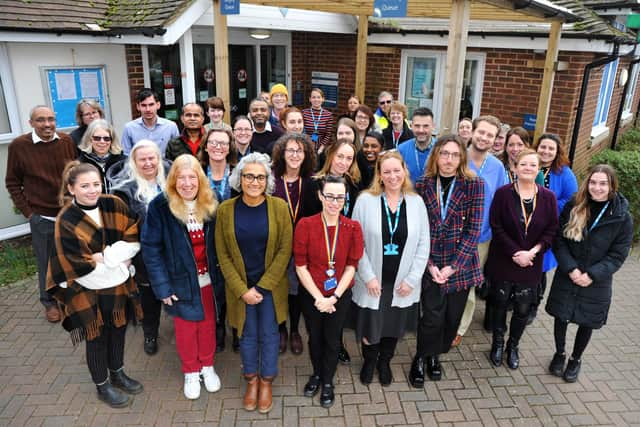New way of screening patients earns Worthing doctors' surgery second Overall Outstanding CQC rating
and live on Freeview channel 276
St Lawrence Surgery cares for 16,000 patients in Worthing and the CQC found it routinely carried out a number of quality improvement projects to meet the changing needs of the local population. The surgery also regularly shares improvement initiatives with other practices to develop services locally and nationally.
Jo Wadey, practice business manager and chair of the West Sussex Practice Managers Association, said: "All the surgeries in Worthing are working really hard at the moment and a lot of good work is being done. Here at St Lawrence Surgery, we were awarded a CQC rating of outstanding again on December 23 and on January 12 we found out we have achieved a gold award from the Pride in Practice Accreditation from the LGBT Foundation.
Advertisement
Hide AdAdvertisement
Hide Ad"Also, all the Worthing surgeries have signed up to work with schools and colleges, and talk directly with the teachers to help children get back into school. They are dealing with high anxiety levels and we are working on a joint approach."


Jo said it was the new clinical signposting system that earned the surgery the Outstanding rating. It was introduced in 2019, just before the pandemic hit, and has been developed and adapted over time. There is a duty team of clinicians, including paramedic practitioners, nurse practitioners and physican associates, who take it in turns to sit in with the receptionists.
Around 600 calls a day – sometimes as many as 1,000 – are being handled and the receptionists take initial details from patients, then put up their hand when they are ready to pass them on to the duty clinician in the room. This happens instantly, while the patient is on the phone, and the decision on every call is made by the clinician. The patient may be given instant advice, may be referred to a specialist member of the team or it may be decided they will be seen by a GP.
Jo said: "It has really helped us because we can direct the doctors to the more serious and more complex cases. We think it works better for the patient because sometimes they can get an answer there and then. We need to get the message across that people don't always need to see a doctor, and try to get people to understand that with things like colds and flu, seven to ten days is normal."
Advertisement
Hide AdAdvertisement
Hide AdJo explained that a GP is not always the best person for the patient to see, for example there are nurses specifically trained in diabetes and asthma. She said the signposting system is better for the patient and better for the receptionist, as the patient knows the decision has been made by a clinician.
Jo pointed out that, sadly, receptionists face daily abuse from patients and as a director of the IGPM (Institute of General Practice Management) she was part of the If I Die It Will Be Your Fault campaign, raising awareness of the threatening behaviour, racist and sexist abuse they receive.
Jo said: "At our surgery, things have improved a lot with the new system. People need to understand the more you tell the receptionists, the more they will be able to help. There is also a lot of self-care advice for adults online and lots of occasions where 111 is appropriate."
Of the patients who are given an appointment at St Lawrence Surgery, 60 to 70 per cent are seen face to face. Jo said patients tend to be given the choice and some find a telephone call to be more convenient.
Advertisement
Hide AdAdvertisement
Hide AdThe CQC said the new system was 'outstanding' and added: "The practice had implemented a patient signposting service and developed the multidisciplinary team in a way that improved access to general practice appointments for patients. There was a demonstrable improvement in GP patient survey results.
"Patients received effective care and treatment that met their needs. Staff dealt with patients with kindness and respect and involved them in decisions about their care."
The surgery was previously inspected in 2016, when it also received a rating of Overall Outstanding from the CQC.